
Who is Wombee for?
Wombee makes it easy to find, connect and grow with mums who truly get you.
Mums and Mums-to-be
Whether you're growing a bump, rocking a newborn, or running after a toddler, Wombee helps you find the right group for you. You can even have multiple groups!
Find
Existing Mothers' Groups
Already have a group? Wombee is purpose built for mother's groups, so it makes it easier to keep the chat going between park plays and pizza nights - without the group text chaos.
Connect
Community Organisations
You bring mums together-we help them stay connected long after the session ends. From baby classes to birthing groups, we make it easy to create and manage multiple groups.
Grow
Key Features
Chat, meetups, support - all in one place.
WhatsApp wasn't built for mothers groups. Wombee was.
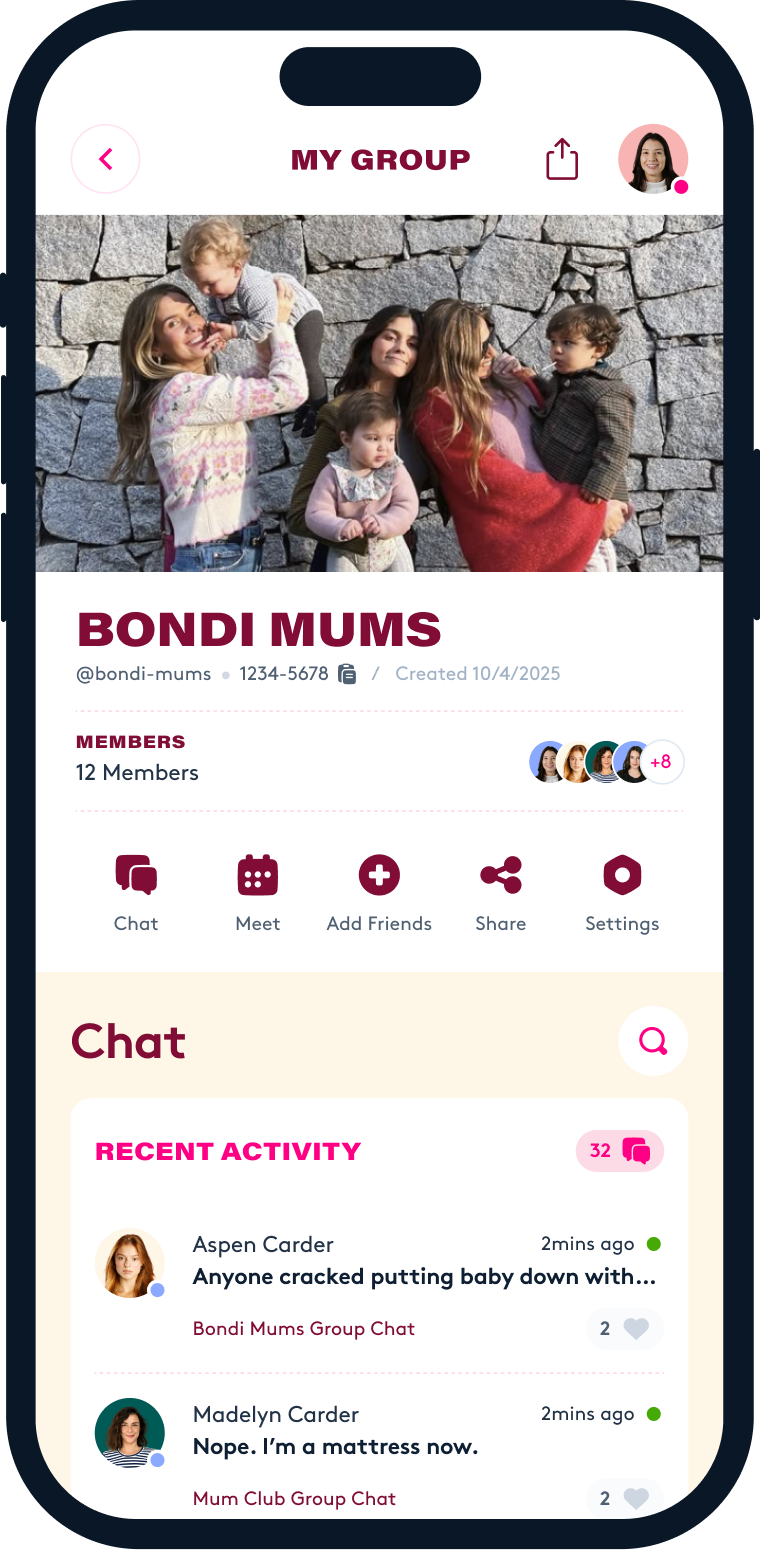
Staying connected matters. Wombee brings your group together with chat, meetups, and support, all in one place, through every stage.
Find Mothers Groups
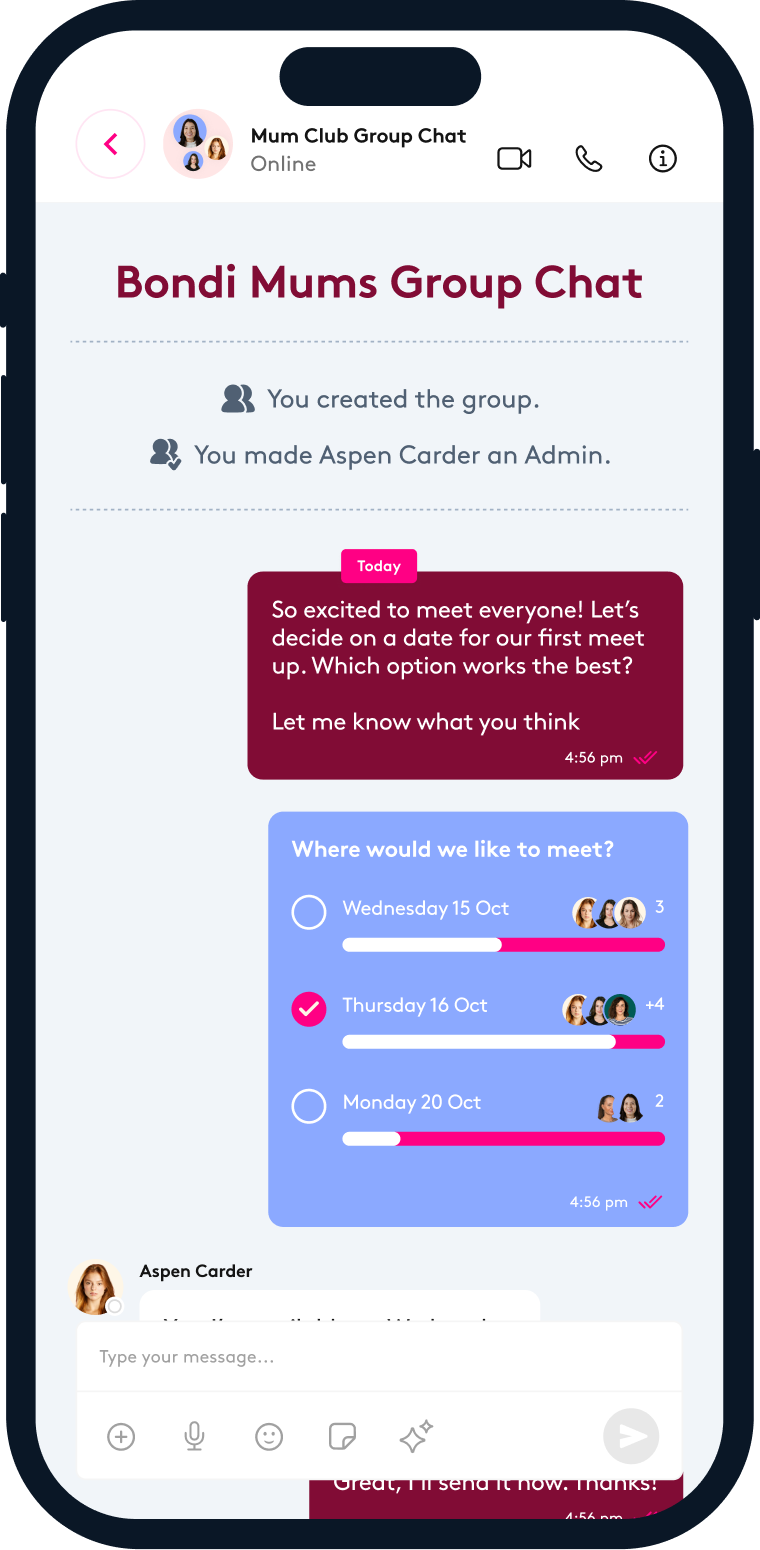
Wombee's built-in group chat keeps conversations flowing, making it easy to share updates, ask questions, and support each other anytime.
Connect With Support
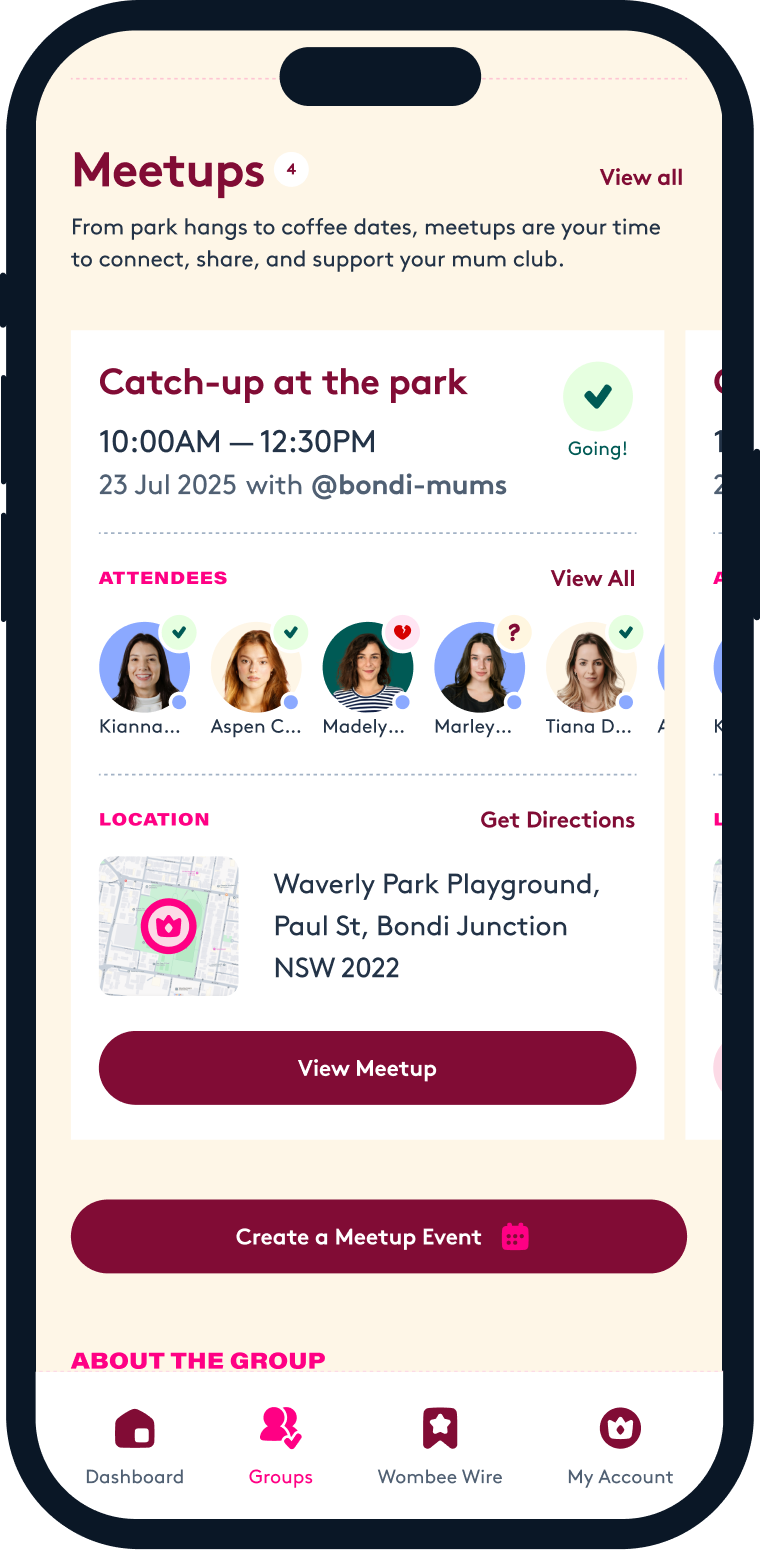
Planning time together is simple with Wombee Meetups, making it easy to organise in-person catch ups that stay connected with your group experience.
Grow Together

How it works
Whether you're after advice, friendship, or just a coffee, here's how it comes together.
1
Download the Wombee App
The Wombee App will soon be available on the Apple and Google App stores for download.
2
Find or Create
Your Group
Find like-minded local Mums or connect your existing group on a platform made for Mother's.
3
Connect & Engage
Chat, share advice, and build friendships with mums who just get it.
4
Grow Together
Motherhood isn't just about your baby's milestones—it's about yours too.
👉
Wombee is live!
Download for free on the App Store and Google Play.
Motherhood is a Journey Let's grow together
At Wombee, we believe in connection, confidence, and community.
Whether you're newly pregnant, in the newborn trenches, or looking to expand your circle, we're here to help you find support, real friendships, and a little more you time. Your Wombee era starts here.
🤍 Wombee - Find. Connect. Grow.
Wombee Wire
Updates from Wombee, stories shared, and voices heard—tune into the heart of our community.
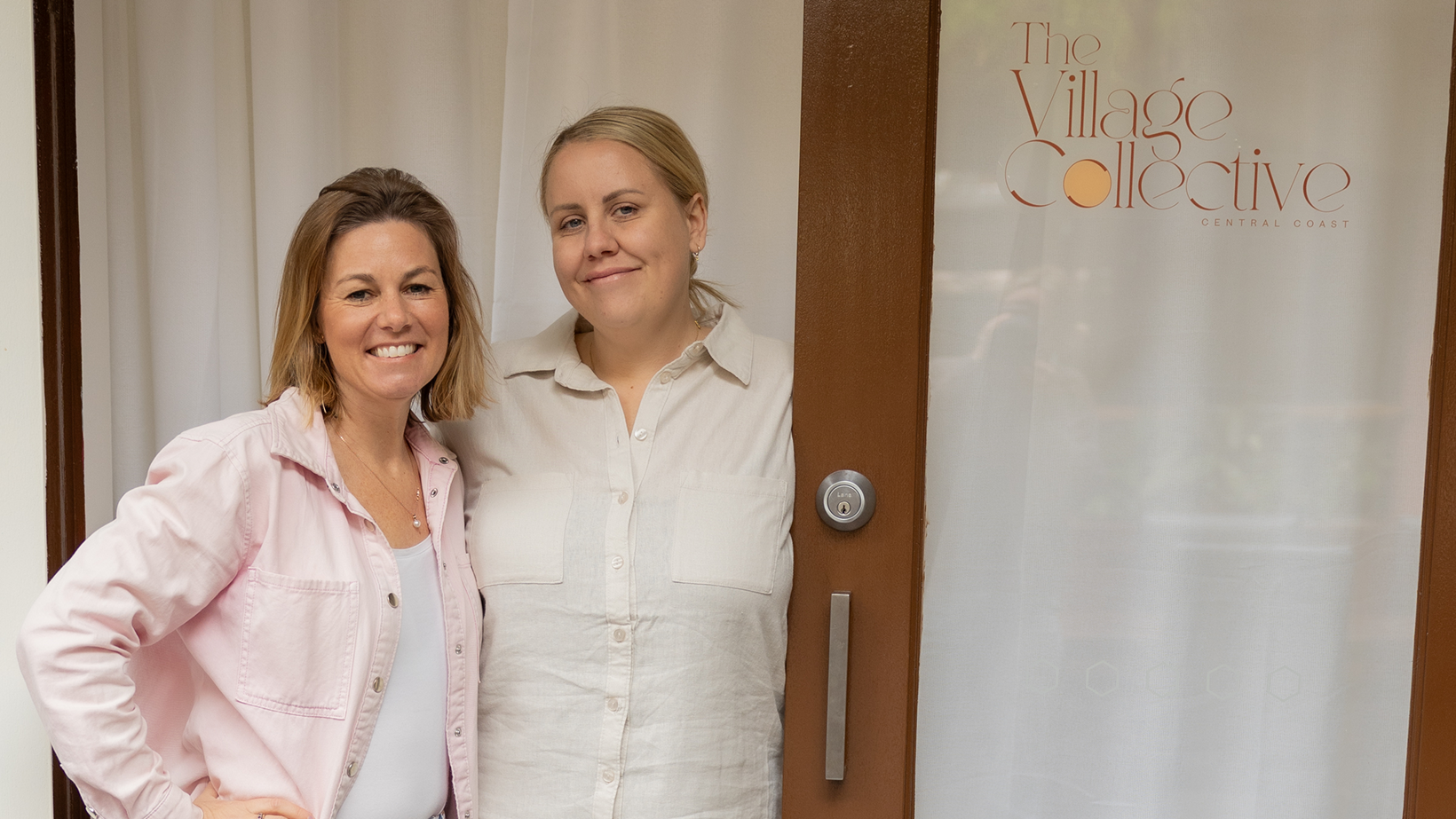
Interview: The Village Collective Central Coast
You both work closely with women through pregnancy, birth and beyond. From your perspective, how does feeling connected—to other mums, to care providers, to community—shape emotional wellbeing during pregnancy and into early motherhood? When a mother has a group of women who align with her values, she feels heard and supported and less alone. The power of chatting with a group of like minded mamas is incredible, you share how you are really getting along with motherhood, you open up because you feel safe and this results in those other mums doing the same. When this happens women are often able to see that others are facing similar challenges that come with motherhoods making us feel less alone with our thoughts.
Tips & Advice
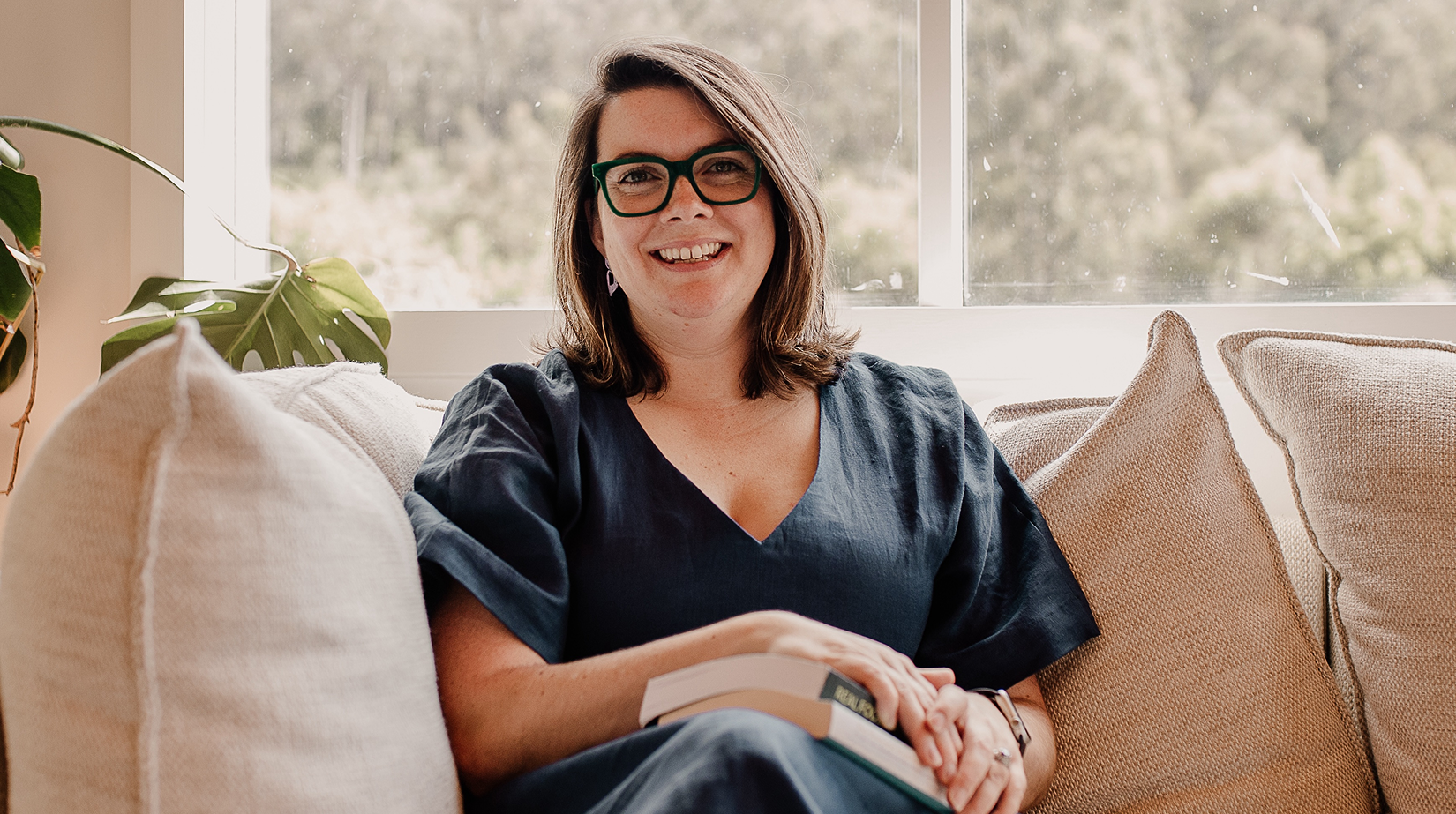
Finding Your Village: A Conversation with Dr. Renee White
1. Let's start at the start. Can you share a bit about your own experience with postnatal anxiety—and what led you to create Fill Your Cup? I've always been a high-achieving, anxious person who thrived on control and planning. After completing my PhD in biochemistry and working as a patent attorney, I became a mother—and it turned my world upside down. I could tell you my baby's size at any point during pregnancy, but I never planned for postpartum. I had no idea that my anxiety history put me at high risk for postnatal anxiety. After my daughter arrived, I couldn't do everything myself as anticipated. We'd moved to a new suburb without support networks, and my husband was busy running our business. I spent long days alone, sleep-deprived, with poor nutrition, struggling with what I thought was postpartum depression but was actually postnatal anxiety. Three years later, during Melbourne's COVID lockdowns, we decided against having another baby largely due to my poor mental health experience. This was devastating—I'd always wanted more children. During those reflective months, I realized I never wanted another mother to endure what I had or miss out on growing her family due to lack of support. So I quit my job, retrained as a postpartum doula, and Fill Your Cup was born. 2. The silent stuff. So many mums say they "didn't realise" what they were feeling was anxiety or depression. Why do you think perinatal mental health is still so misunderstood or overlooked? It's multifactorial. Many mothers are told their symptoms are just "normal motherhood transition feelings" and are dismissed. Others feel embarrassed or ashamed to ask for help, or feel too vulnerable to share their struggles and recognize they may need support. We desperately need more awareness around early signs of postnatal anxiety and depression because research shows it's much easier to prevent than treat these conditions. 3. If only we knew…What do you wish more mums knew about emotional wellbeing during pregnancy and the early postpartum period? I wish more women understood matrescence—the transition from maiden to mother, similar to adolescence. We experience brain remodelling, hormonal changes, and shifts in our immune and endocrine systems. It feels like an out-of-body experience, but our bodies and brains are adapting with new maternal circuitry to help us become the best mothers we can be. This happens from conception, which explains the brain fog, confusion, and why everything feels so different. When mothers understand the "why" behind these changes, it reduces anxiety and stress around the unknown. Education is crucial. 4. Let's talk red flags. What are some signs a mum might be struggling with more than just "the baby blues"? While I'm not a psychologist, red flags we watch for include feeling consistently withdrawn, sad, and unable to get out of bed. Loss of appetite, severe lack of motivation, thoughts of harming yourself or your baby, not wanting to leave the house or interact with others, and feeling teary all the time are all concerning signs that warrant professional support. 5. Support looks different for everyone. In your experience, what does meaningful support look like for a mum navigating perinatal mental health challenges? Support must be tailored to each mother's needs. It might be a daily voice message from a friend, meal deliveries to reduce the mental load, meeting at the park with coffee while someone holds the baby, or help with night feeds. Most importantly, it's about holding space and listening so she feels heard and validated in her feelings. 6. Finding your people. What would you say to a mum who feels isolated, like she hasn't "found her village" yet? First, try local parent groups—library rhyme time, baby sensory classes, or walking groups. Social media can help introverts connect before meeting face-to-face. Remember, your village doesn't need to be huge. We have this misconception that we need a giant mothers group. It can be just one or two people you meet weekly at a park or café, or simply text to share experiences. Quality over quantity matters. 7. From your own experience or through Fill Your Cup. Have you seen a moment where a mother's group genuinely shifted someone's mental health or outlook? I've seen mothers groups impact mental health both positively and negatively. I had a devastating experience where another mum said my baby was "broken" because she catnapped, sending me down a spiral of self-doubt. In hindsight, I'd tell myself that catnapping is completely natural and I was doing an amazing job. Conversely, I've witnessed beautiful friendships form where mums holiday together, co-parent when partners are away, cook together, and share domestic responsibilities. The ripple effect on their mental health is incredible—they share experiences and lighten each other's load. 8. Let's be honest, joining a mums group can feel awkward at first. What would you say to someone who's nervous about walking into that first meetup or sending the first message? Everyone feels nervous about that first meetup and first message—you're absolutely not alone. Just take the plunge. You may be pleasantly surprised. 9. Fill Your Cup in action. What's one story or moment from Fill Your Cup that's stuck with you—the kind that reminds you why this work matters? The moments that stick with me are when exhausted parents call us three or four weeks postpartum, already struggling without prior doula planning. They're sleep-deprived, can't make meals, their partner's returning to work, and their mental health is suffering. We literally have Google reviews saying we "saved" them—from poor mental health outcomes, relationship breakdown, or nutritional depletion. When they're supported, they have capacity to be better partners and mothers. We're not just helping this generation of mothers; we're helping the next generation of children have a positive start to life. 10. Wombee is all about helping mums find their people—from pregnancy, to newborn life, to toddlerhood and beyond. From your perspective, what kind of impact do you think something like Wombee could have on a mum's mental health and overall wellbeing? Research shows mothers need four pillars to thrive, including sharing experiences. When mothers can't compare their experiences with others going through similar circumstances, they feel alone and start filling gaps with negative thoughts—"I'm not a good enough mother" or "my baby isn't normal." When you connect with another mum experiencing something similar, you don't feel so alone. This directly impacts mental health and wellbeing because there's nothing scarier than thinking you're the only person on earth going through something. 11. Final Q: if you could whisper something to every first-time mum…What would it be? You're doing an amazing job. It's completely normal and actually beneficial to lie in bed holding your baby all day—you're creating hormonal cocktails in both your brains that set the foundation for positive mental health. Forget the dishes and laundry. You're doing enough as you are.{{ include_custom_fonts({"Brown Std":["Regular","Bold"]}) }}
Tips & Advice
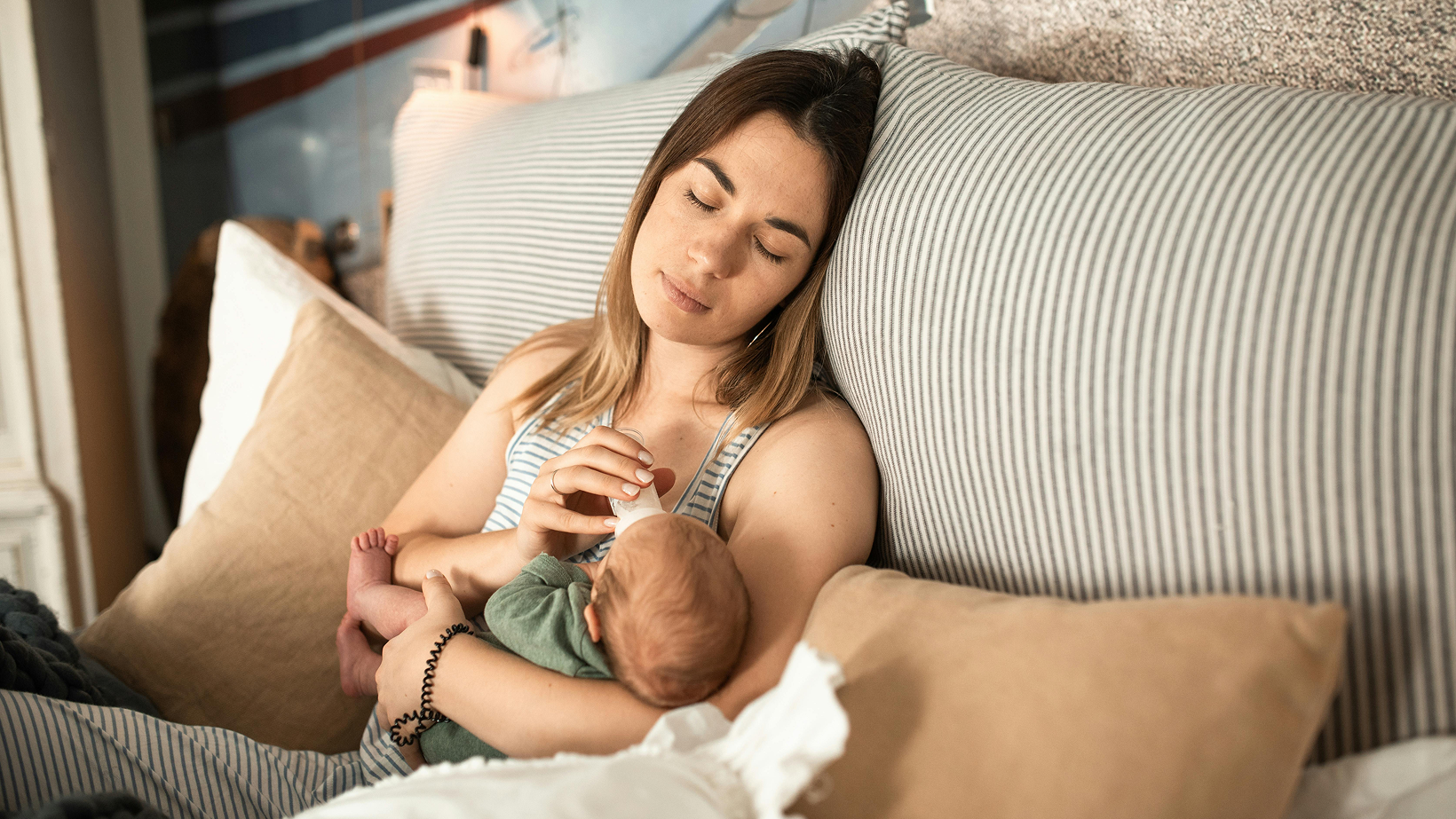
A New Mums Guide to Finding Your Village
Attend Local Parent or Baby Groups (Even Just Once) I attended a local library Rhyme Time and slowly built up the courage to chat with other mums. Which in turn, evolved into grabbing a coffee afterwards, which evolved into exchanging numbers and park meet-ups.
Tips & Advice
